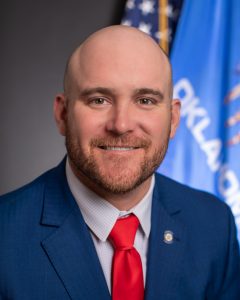
The claims of former Corporation Commissioner Jim Roth about Rep. Trey Caldwell’s HB2747 are being denied by the legislator from the southern Oklahoma town of Faxon.
Roth called HB2747 a “ROFR” bill but in a response to OK Energy Today’s inquiries, Rep. Caldwell said it is not a “right of first refusal bill.” He also asserted that Roth’s business connections affect the stance he took on the measure.
“I contest former Commissioner Roth’s characterization of it as such,” he replied “It’s a bill that protects Oklahoma rate payers and encourages economic development with its sister bill being carried by Brade Boles which is colloquially called “BTM.””
Caldwell went on to state that his bill will give Natural Gas a “fighting chance to compete when bidding into the SPP for new generation by changing some of the accounting methods used when on-boarding new facilities, and rehabbing and extending operational life of existing facilities.”
He continued that the bill, if made into law, would prevent IOU’s (i.e. OGE & AEP, PSO) from using ratepayers subsidies to switch from one fuel source applicance to another.”
Caldwell said his bill also increases the number of companies that can bid on and build transmission lines to the same extent that exists with generation assets. Plus, he explained his bill would pull back regulatory authority from federal bureaucracy at FERC, by requiring ownership to be held by someone with retail customers in Oklahoma. It ensures, he said, OCC jurisdiction.
The legislator further charged that former commissioner Roth and his law firm have a “monetary/client/cnsulting relationship with NEXTERA Transmission” which has been using a loop hole in Federal Energy Regulatory Commission rules to “circumvent OCC regulatory oversight.”
“Lest we forget they do not have a legal obligation to serve nor do they in their current capacity have to report to the Oklahoman elected OCC,” continued Rep. Caldwell. “In fairness to them (NEXTERA) they do have the most to lose if this bill was to become law.”
The Republican Representative said under the bill, NEXTERA would still be able to build transmission lines in Oklahoma but not able to operate them and charge Oklahoma rate payers for the asset for 20-30 years.
“At the end of the day, this bill will increase competition in the generation and transmission sector of a rate payers bill. Thereby applying a down ward pressure on the rising utility bill environment,” he professed.
Below is his entire response:
First, I would say that HB2747 isn’t a “right of first refusal” bill. I contest former Commissioner Roth’s characterization of it as such. It’s a bill that protects Oklahoma rate payers and encourages economic development with its sister bill being carried by Brad Boles which is colloquially called “BTM”.
HB2747, will give Natural Gas a fighting chance to compete when bidding into the SPP for new generation by changing some of the accounting methods used when on-boarding new facilities, and rehabbing and extending operational life of existing facilities (this same change was made in Kansas recently and we have seen projected cost savings of 10-17% in net cost of construction). It also prevents IOU’s (ie OGE & AEP-PSO) from using ratepayers subsidies to switch from one fuel source appliance to another. The third piece increases the number of companies that can bid on and build transmission lines to the same extent that we see with generation assets. This occurs because under current rules at FERC state in order to build a transmission line you must be able to prove you can operate it long term. The fourth pillar in the bill focuses on the operational ownership of the High voltage Transmission lines (ie above 300KVA), which would be owned by internodal operator that has retail customers in the state of Oklahoma but if they wanted to construct said line they would have to bid into the RFP just like any other construction company. Thereby pulling back regulatory authority from federal bureaucracy at FERC commission which allows a 11.2% ROI of rate based transmission assets to the Oklahoma Corporation Commission which currently allows for an approximate 9.5% ROI of transmission assets. By requiring ownership to be held by someone with retail customers in Oklahoma it ensures OCC jurisdiction.
Secondly, I’d like to point out that, while I respect former commissioner Roth and his broad knowledge base when it comes to Utility policy, in this instance we disagree. It should furthermore be noted that he and his law firm has a monetary/ client/ consulting relationship with NEXTERA Transmission, and/or their parent company Florida Light and Power and other affiliates. Which has been using this loop hole in the FERC order 1000 to circumvent OCC regulatory oversight. Lest we forget they do not have a legal obligation to serve nor do they in their current capacity have to report to the Oklahoman elected OCC. In fairness to them (NEXTERA), they do have the most to lose if this bill was to become law. While they would still be able to build transmission lines in Oklahoma but they wouldn’t be able to operate them and charge Oklahoma rate payers for the asset for 20-30 years. At a rate the current OCC deems 20% higher than they currently think is prudent.
At the end of the day this bill will increase competition in the generation and transmission sector of a rate payers bill. Thereby applying a down ward pressure on the rising utility bill rate environment. It will end IOU subsidized source switching. While increasing accountability and oversight within the state of Oklahoma on the operational cost of transmission lines. This occurs by the fact local interveners (ie. Industrials, AARP, ect. ) would be able to contest the nature and prudence of any operational expense that was brought forth by OGE, Liberty or AEP during a traditional rate case. All while promoting economic development and faster time to the market for on-lining new generation and HV Transmission.


